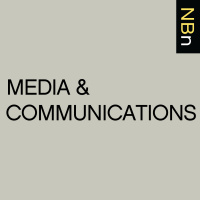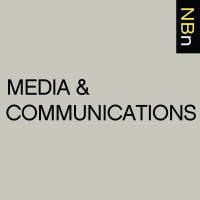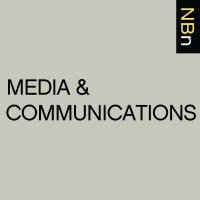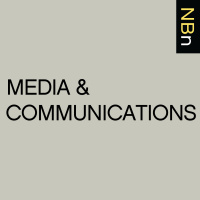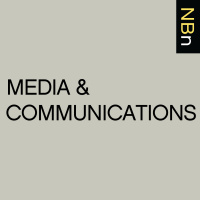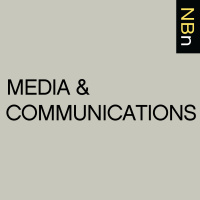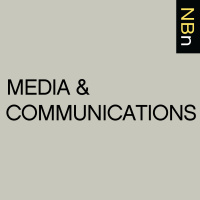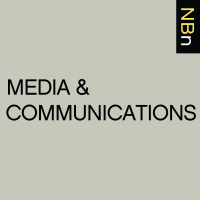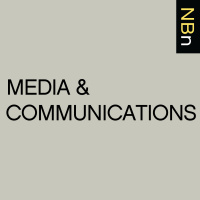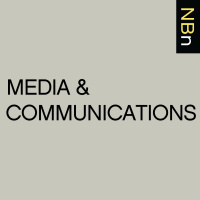Synopsis
Interviews with Scholars of Media and Communications about their New Books
Episodes
-
John Nathaniel Clarke, “British Media and the Rwandan Genocide” (Routledge Press, 2018)
04/05/2018 Duration: 01h11minIt seems safe to assume that media coverage changes the behavior of politicians and voters. And it seems safe to assume this happens in cases of humanitarian crisis. But it’s really hard to go beyond these platitudes to determine exactly how this feedback loop works. John Nathaniel Clarke’s new book, British Media and the Rwandan Genocide (Routledge, 2018), uses Rwanda as a test case to tease out the relationship between media coverage and policy. To do so, he uses carefully structured, labor intensive and analytically rich process to determine exactly what the media was reporting and writing about the genocide. By examining the media coverage so systematically, he is also able to detect changes over time in the nature of the reporting. He then examines the way in which members of parliament respond to the reports, analysis and op-eds in a variety of British newspapers. Clarke knows his way around an excel spreadsheet, and his analysis is statistically sophisticated and his conclusions carefully consid
-
Mark A. McCutcheon, “The Medium Is the Monster: Canadian Adaptations of Frankenstein and the Discourse of Technology” (Athabasca UP, 2018)
03/05/2018 Duration: 01h18minWhat do Mary Shelley’s Frankenstein, media theorist Marshall McLuhan and Canadian popular culture have in common? This is the question that Mark A. McCutcheon seeks to answer in his new book, The Medium Is the Monster: Canadian Adaptations of Frankenstein and the Discourse of Technology, published in 2018 by Athabasca University Press. In this unique and penetrating analysis, McCutcheon argues that Shelley’s 1818 novel essentially reinvented the word “technology” for the modern age, establishing its connections with ominous notions of manmade monstrosity. In the twentieth century, this monstrous, Frankensteinian conception of technology was globalized and popularized largely through Marshall McLuhan’s media theory and its numerous, diverse adaptations in Canadian popular culture. The Medium is the Monster establishes Frankenstein, and its various adaptations, as the originating intertext for a modern conceptualisation of technology that has manifested with a unique potency in Canadian pop culture, informing w
-
B.J. Mendelson, “Privacy: And How to Get It Back” (Curious Reads, 2017)
03/05/2018 Duration: 47minThe use of our data and the privacy, or lack thereof, that we have when we go online has become a topic of increasing importance as technology becomes ubiquitous and more sophisticated. Governments, advocacy groups and individual citizens are demanding that action be taken to protect their valuable data. But what does this sporadic noise amount to? B.J. Mendelson in his book Privacy: And How to Get It Back (Curious Reads, 2017) argues that a complacent citizenry and the overly-intimate relationship that corporations have with government has led to massive breaches of people’s privacy. Mendelson humorously explains the way people’s data is used and abused as he tracks the long history of government surveillance leading to an explanation of, what he believes, could be the solution to the abuse of people’s privacy. Learn more about your ad choices. Visit megaphone.fm/adchoices
-
Yutao Sun and Seamus Grimes, “China and Global Value Chains” (Routledge, 2018)
30/04/2018 Duration: 44minToday I was joined by Seamus Grimes from Ireland where he is Emeritus Professor at the National University of Ireland, Galway. With Yutao Sun (Dalian University of Technology), he just published a very interesting and timely book China and Global Value Chains: Globalization and the Information and Communications Technology Sector (Routledge, 2018). President Trump has raised the intriguing question of bringing the manufacturing of companies like Apple back from China to the U.S. This book, however, argues that in this age of the knowledge-based economy and increased globalization, that value creation and distribution based on knowledge and innovation activities are at the core of economic development. The double-edged sword of globalization has transformed China’s economic development in the past few decades. Although China has benefitted from globalization and is now the second largest economy in the world, having become a global manufacturing power and the biggest exporter of high-tech products, it continu
-
Bhoomi Thakore, “South Asians on the U.S. Screen: Just Like Everyone Else?” (Lexington Books, 2018)
26/04/2018 Duration: 38minHow does the portrayal of a character like Apu matter? What does the representation of South Asian TV characters tell us about society at large? In her new book, South Asians on the U.S. Screen: Just Like Everyone Else? (Lexington Books, 2018), Bhoomi Thakore uses interviews and audience studies to explore these questions and more. By having participants list South Asian characters they’ve seen on TV, she learns a lot about representation in addition to the positive and negative characteristics attributed to these characters. Often times South Asians are relegated to minor characters in shows and Thakore explores how The Mindy Project breaks out of this mold. Exploring ideas and concepts including “forever foreigners,” assimilation, and acculturation, Thakore analyzes this media sociologically. The book also sheds light on the portrayal of South Asian female characters specifically, as well as how some shows emphasize the “every-day”-ness of some South Asian characters versus those portrayed as tokens. Overa
-
Anamik Saha, “Race and the Cultural Industries” (Polity, 2018)
09/04/2018 Duration: 48minHow do the media make race? This question is at the heart of Race and the Cultural Industries (Polity, 2018), the new book by Anamik Saha, Lecturer in Media, Communications and Promotion at Goldsmiths, University of London. The book sits between critical race theory and the political economy of culture, proving to be an astute and valuable contribution to a field that, as yet, has yet to find a definitive take on the question of race and the cultural industries. The book is filled with examples from media, including news rooms, publishing, music, theatre and film, as well as rich and detailed theoretical engagements with scholarship accounting for the often hidden structures that give us a culture dominated by the norms of whiteness. It is not only essential reading for media studies scholars, but also is important for anyone interested in contemporary culture. Learn more about your ad choices. Visit megaphone.fm/adchoices
-
Jeanine Kraybill, “Unconventional, Partisan, and Polarizing Rhetoric: How the 2016 Election Shaped the Way Candidates Strategize, Engage, and Communicate” (Rowman and Littlefield, 2017)
03/04/2018 Duration: 22minIn Unconventional, Partisan, and Polarizing Rhetoric: How the 2016 Election Shaped the Way Candidates Strategize, Engage, and Communicate (Rowman and Littlefield, 2017), Jeanine Kraybill, assistant professor of political science at Cal State University, Bakersfield, has edited a timely book on the 2016 election. From all accounts, the 2016 election was unusual, and the role of political communication was no different. Using a variety of methods, the chapter authors examine how rhetoric and political communication shaped the tone of campaigns and ultimate outcomes of the election. They study how candidates primed voters for an anti-establishment candidate. They also examine how political communication influenced key campaign issues such as climate change, immigration, national security, religion, and gender. Learn more about your ad choices. Visit megaphone.fm/adchoices
-
Natalia Roudakova, “Losing Pravda: Ethics and the Press in Post-Truth Russia” (Cambridge UP, 2017)
30/03/2018 Duration: 49minNatalia Roudakova’s book Losing Pravda: Ethics and the Press in Post-Truth Russia (Cambridge University Press, 2017) explores changes in the world of journalism in Russia in the last fifty years. Drawing from more than a decade of research of various ethnographic and historical sources, Roudakova approaches truth as a social category. She demonstrates that the status of truth was relatively secure and stable under the Soviet state socialism. It was the transformation from communism to capitalism that led to a drastic dissolution of a sense of responsibility towards the public and, consequently, into the very possibility to produce truth in the post-socialist era. Looking into everyday practices of Soviet journalists and the post-socialist transformation of the media, Losing Pravda provides a glimpse into one possible future of the US and other post-truth settings in the West. Exploring how truth-seeking and truth-telling work under different socio-political conditions, it offers a new, ethics-based vocabulary
-
Dahlia Schweitzer, “Going Viral: Zombies, Viruses, and the End of the World” (Rutgers UP, 2018)
29/03/2018 Duration: 01h05minEveryone loves a good conspiracy theory as we prep for the zombie apocalypse. In her new book Going Viral: Zombies, Viruses, and the End of the World (Rutgers University Press, 2018), Dahlia Schweitzer brings them together as she explores the outbreak narrative in popular film, television and other media. Examining the outbreak narrative in popular culture, Schweitzer traces the film cycle of the outbreak narrative as it plays out in the themes of globalization, terrorism, and the end of civilization. Schweitzer explores how popular cultural narratives in additional to official media sources heighten and perpetuate the fears created through the outbreak narrative. Although we leave in a world that is far safer today than most any time in history, the outbreak narrative as it is structured in popular culture creates a pattern of fear and conspiracy theories that are representative of larger societal panics. Well researched and covering a wide array of film, television, and other media that address the outbreak
-
Daniel J. Kapust, “Flattery and the History of Political Thought: That Glib and Oily Art” (Cambridge UP, 2018)
29/03/2018 Duration: 01h14minDaniel Kapust‘s book, Flattery and the History of Political Thought: That Glib and Oily Art (Cambridge University Press, 2018), is a rich and fascinating exploration of political thought through the complex lens of the question or concept of flattery. The book traces this complicated concept through both many of the “expected” writers and thinkers in the western political theory canon while also integrating some unexpected thinkers. Kapust positions many of these thinkers in encounters with each other—exploring the kinds of conversations these thinkers might have with each other. The encounters between authors and texts tease out the differing understandings of flattery and the way that it can be used in political contexts as well as within the affective webs in which humans live and engage with one another on a personal level. Thus, Kapust situates flattery within politics, provides the reader with different definitions of flattery, and also teases out the differences between flattery and friendship. The boo
-
Vanda Krefft, “The Man Who Made the Movies: The Meteoric Rise and Tragic Fall of William Fox” (Harper, 2017)
28/03/2018 Duration: 01h05minWhen you hear “Twentieth Century Fox,” I doubt you know where the source of “Fox” in the name. In her book, The Man Who Made the Movies: The Meteoric Rise and Tragic Fall of William Fox (Harper, 2017), Vanda Krefft presents a detailed biography of one of the founders of the American film industry, whose successes are largely unknown because of his ultimate downfall. Learn more about your ad choices. Visit megaphone.fm/adchoices
-
Dorothy Noyes, “Humble Theory: Folklore’s Grasp on Social Life” (Indiana UP, 2016)
22/03/2018 Duration: 01h21minHumble Theory: Folklore’s Grasp on Social Life (Indiana University Press, 2016) is an anthology of essays from Dorothy Noyes, professor of English and Comparative Studies at the Ohio State University and president of the American Folklore Society. The collection of essays takes aim at some of the critical questions that the discipline of folklore faces in the twenty-first century. From seminal keyword essays (monsters, she calls them) on group, tradition, and aesthetics that set out the state of the field, to studies of the historical uses of tradition at different moments across Europe, to critiques of present-day slogan-concepts like Intangible Cultural Heritage and resilience, Humble Theory: Folklore’s Grasp on Social Life (Indiana University Press, 2016) sets out to see how the discipline of folklore, with its emphases on vernacular theorization—as opposed to grand or high theories—provides unique insights into society more broadly. Ultimately, it seems, the strength and weaknesses of folklore might simul
-
Bruce Clarke, “Neocybernetics and Narrative” (University of Minnesota Press, 2014)
22/03/2018 Duration: 01h19minAs Paul Whitfield Horn Professor of Literature and Science at Texas Tech University, Bruce Clarke has spent the last decade-plus publishing groundbreaking scholarship introducing the application of second-order systems theory to the analysis of literature and media more broadly. The staggering scope of Clarke’s multidisciplinary erudition is on full display in the monograph, Neocybernetics and Narrative, out from University of Minnesota Press in 2014. In picking up Niklas Luhmann’s neologism “neocybernetics” in place of a more standard second-order cybernetic label, Clarke carves out a theoretical continuum for his thinking that runs along a trajectory from Heinz von Foerster’s notions of the observer, through George Spencer-Brown’s Laws of Form, Maturana and Varela’s biology of cognition, and right up to, and including, Niklas Luhmann’s controversial extension of autopoiesis theory to metabiotic social systems; a theoretical move most often excluded from more orthodox second-order cybernetic thinking. The fo
-
Polarization with Shanto Iyengar
22/03/2018 Duration: 29minShanto Iyengar is Professor of Political Science at Stanford University. He has written extensively on news media and political communication in contemporary democracy. His most recent book is titled Media Politics: A Citizen’s Guide (W. W. Norton, 2015); new edition is forthcoming this year. His current research focuses on political polarization, framing effects, and political affect. The "Why We Argue" podcast is produced by the Humanities Institute at the University of Connecticut as part of the Humility and Conviction in Public Life project. Learn more about your ad choices. Visit megaphone.fm/adchoices Support our show by becoming a premium member! https://newbooksnetwork.supportingcast.fm/communications
-
Hoda Yousef, “Composing Egypt: Reading, Writing, and the Emergence of a Modern Nation, 1870-1930” (Stanford UP,
20/03/2018 Duration: 35minLiteracy is often portrayed as a social good. Composing Egypt: Reading, Writing, and the Emergence of a Modern Nation, 1870-1930 (Stanford University Press, 2016), Hoda Yousef has a different take on it, portraying it as a tool. Yousef uses reading and writing to interrogate how new social practices were changing Egypt in the late nineteenth and early twentieth centuries, demonstrating how they were used to further divide or fracture the public sphere. Literate, illiterate, and semi-literate Egyptians all engaged in the written word via different means, be they petition-writers, those who appealed to scribes, or coffee-house frequenters who all gathered to hear a newspaper be read. Ultimately, it was the emergence of this diversely literate population that shaped the Egyptian nation that emerged in the twentieth century. Hoda Yousef is assistant professor at Denison University, previously she served as an assistant professor of history at Franklin and Marshall College. She is a historian of the modern Middle
-
Christine E. Evans, “Between Truth and Time: A History of Soviet Central Television” (Yale UP, 2016)
09/03/2018 Duration: 58minIn Between Truth and Time: A History of Soviet Central Television (Yale University Press, 2016), Christine E. Evans reveals that Soviet television in the Brezhnev era was anything but boring. Whether producing music shows such as Little Blue Flame, game shows like Let’s Go Girls or dramatic mini-series, the creators of Soviet programming in the 1950s through 1970s sought to produce television that was festive. Evans demonstrates that television programmers conducted audience research and audience voting as they attempted to meet Soviet citizens’ expectations and hold their interest. Rather than stagnating, the producers and filmmakers experimented with multiple forms, in particular in presenting the news. In this interview, Christine Evans discusses her thoroughly researched and entertaining study, and what we can learn about Soviet society in the Brezhnev era through the television it created and watched. Christine E. Evans is assistant professor of history at the University of Wisconsin-Milwaukee. Amand
-
Aidan Smith, “Gender, Heteronormativity, and the American Presidency” (Routledge, 2017)
07/03/2018 Duration: 01h04minAidan Smith has written a timely and important analysis of the way that we understand images, masculinity, and femininity, especially through the lens of presidential campaigns and political advertising. Smith’s book, Gender, Heteronormativity, and the American Presidency (Routledge, 2017) explores the idea of heteronormativity within our implicit and explicit conceptions of the American presidency—thus focusing not only on how masculinity is deployed to create particular images of candidates running for office, but also how femininity is used for both first ladies, and for female candidates for the White House who must negotiate an even more complicated set of expectations given our two hundred year history with the occupants of the Oval Office. Smith delves into the complexity of gender performance in presidential politics, and how embedded expectations of patriarchy, fatherhood, manly success, and particular experiences (wartime, boardroom, etc.) all contribute to expectations that are applied to those run
-
Kathryn Woolard, “Singular and Plural: Ideologies of Linguistic Authority in Twenty-First Century Catalonia” (Oxford UP, 2016)
06/03/2018 Duration: 01h42minKathryn Woolard is Professor Emerita and Research Professor of Anthropology at the University of California, San Diego. She has authored seminal works on language ideology and the sociolinguistic situation in Catalonia, including the present book Singular and Plural: Ideologies of Linguistic Authority in Twenty-First Century Catalonia (Oxford University Press, 2016) which won the 2017 Society for Linguistic Anthropology Edward Sapir Book Prize. Bringing together two of her longstanding areas of research interest in this book, Woolard develops a framework for analyzing ideologies of linguistic authority and applies it to the evolving political situation in Catalonia. In this interview, Woolard discusses the key theoretical and contextual elements of the book, broadly following its three-part structure. First, the concepts of linguistic authenticity, anonymity, sociolinguistic naturalism are introduced, and Woolard sets out the changing ideological grounding of linguistic authority there over the course of twe
-
Jon Kraszewski, “Reality TV” (Routledge, 2017)
01/03/2018 Duration: 54minIn his book Reality TV (Routledge, 2017), author Jon Kraszewski explores reality television’s relationship to the American cityscape. Starting with show such as Candid Camera and An American Family, Kraszewski positions reality television in cities where individuals were able to thrive regardless of social class. In this space, early reality television created a laboratory for individuals. Moving to the early 1990s and beyond, Kraszewski challenges the ways in which reality television persisted in this relationship with the city although most viewers do not have the means to live in cities. Using case studies of how the Bravo network exploits the urban servant, the examination of “Boston” Rob Marino and Tiffany “New York” Pollard as reality show representative of major global American cities, and how shows such as Here Comes Honey Boo Boo, Alaska: The Last Frontier, and Swamp People, Krasweski present the complex and often problematic relationships between American urban space and the way in which reality tel
-
Jeffrey Shandler, “Holocaust Memory in the Digital Age: Survivors’ Stories and New Media Practices” (Stanford UP, 2017)
19/02/2018 Duration: 55minHow do technological advances and changing archival practices alter historical memory? In what ways have developments in the preservation and dissemination of historical material already impacted how scholars and the public engage with the past? These are questions that Jeffrey Shandler, Professor of Jewish Studies at Rutgers University, grapples with in his new book, Holocaust Memory in the Digital Age: Survivors Stories and New Media Practices (Stanford University Press, 2017) Shandler’s thought-provoking and skillfully written book addresses these problems through the lens of the Holocaust and Holocaust memory. Specifically, he examines the wealth of material curated by the Shoah Foundations Visual History Archive, which houses a wealth of over 50,000 newly-digitized videos of interviews conducted with survivors of the Holocaust and other genocides. Shandler analyzes this footage by reading “against the grain” and using the testimonies for purposes other than those intended by the Archive’s creators when

